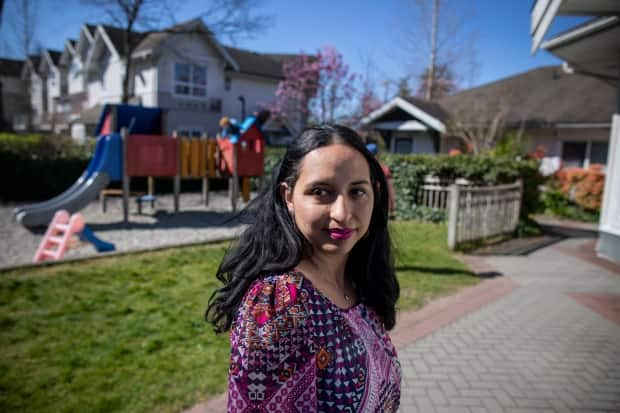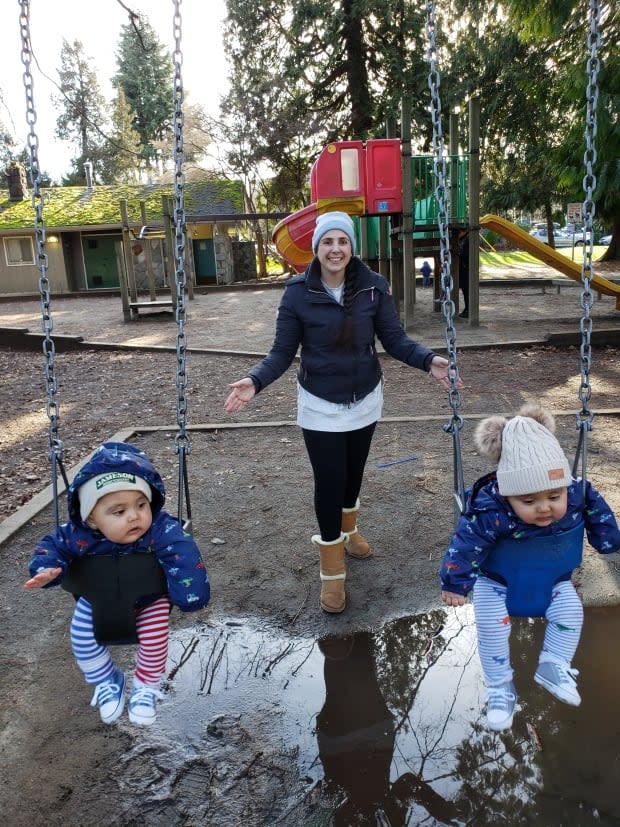Too good to be true — or too late? Here's what parents think of Ottawa's new child care plan

After a year of heightened stress for many parents, the federal government's plan to reduce child care costs across the country is, for some, a light at the end of the tunnel.
Alexis Geroux says the possibility that she could pay 50 per cent less on child care by the end of next year feels too good to be true.
"It's like a ray of sunshine," said Geroux, who lives in Ottawa with her husband and two boys, who will be one and two years old by the time she goes back to work.
Geroux is on maternity leave and needs to return soon to her full-time job in recreation management, in-person, so child care will be a necessity. She expects to pay as much as $2,500 a month to put both kids in full-time care.
Paying less next year would mean fewer sacrifices for her family, and could allow her and her husband to contribute more to their children's Registered Education Savings Plans.
"We really hope it does go through, because that would help us a lot," said Geroux.
That outcome isn't certain, and will come too late for some. For others, more affordable child care will make a difference in whether they return to work at all, which is why — after a year where women's participation in the workforce fell sharply — the Liberal government says now is the time to take long-promised action on child care.

'Women drop out'
If the budget passes, the federal government plans to spend up to $30 billion over the next five years to reduce child care fees by half within the next 18 months, then eventually to $10 a day by 2026.
Finance Minister Chrystia Freeland says the national child-care plan is needed to make sure parents, especially women, return to the workforce post-pandemic.
"We've seen the reality that when you do not have child care available women drop out of the labour force. That's what has happened in this COVID year," said Freeland in an interview with CBC's chief political correspondent, Rosemary Barton, after tabling the federal budget on Monday.

Federal data on who's applied for the Canada recovery caregiving benefit shows that in every province, more women than men have stepped away from their jobs to care for their children.
Global chief economist at Manulife Asset Management, Frances Donald, says there has been an awakening over the past year, as data from around the world has underscored the link between child care and parents' ability to work.
"The consensus has turned its opinion entirely around from child care being a social issue to one of very important economic infrastructure," said Donald.
"We have a wealth of data that shows us how critical child care and early learning is to economic strength, and that it helps improve female labour force participation rates."
Feeling stuck
It's a reality mother-of-three Amanda Aron Chimanovitch was already living pre-pandemic.
The high cost of child care in Richmond, B.C., prevented her from re-entering the workforce as a journalist since having her youngest son two years ago.
"I would work just to pay for daycare," said Aron Chimanovitch. She's been quoted $3,000 a month for her two younger children, she said; her eldest is in kindergarten.

Chimanovitch says that while she stays home to care for her children, she watches friends and former colleagues grow in their careers.
"What am I able to do now, maybe change diapers and watch kids? This was not like this before," said Aron Chimanovitch. "I was a good professional, and now I feel that I am stuck."
She hopes the 50 per cent reduction in child care fees next year will be enough for her to get back to work.
"I can see a light at the end of the tunnel," she said.
"If I could go back to work and help the recovery, it would be really great — for me, and the country."
Will provinces play along?
For those who have advocated for a national, affordable child care strategy, the Liberals' plan is the progress they've been hoping for — for decades.
"This is such a historic moment," said Amy O'Neil, director of Treetop Children's Centre in Toronto.

She says the budget's emphasis on ensuring early childhood educators are at the heart of the system is also groundbreaking.
"I think it will allow more [early childhood educators] to stay in the field, because they will be feeling recognised with proper compensation and proper training, which has never been the case."
O'Neil acknowledges that there is still much more work to be done to develop and execute a plan that her provincial government is on board with.
Some provinces, including Alberta and Ontario, have said they want more flexibility with how the federal funds are used to support families.
But O'Neil expects Ontario will ultimately "play well in the sandbox" and accept the money from the federal government and the terms that come with it.
"Families in this province will never forgive them for that if they don't," said O'Neil.
Too late for some
But even if the Liberals' budget passes, deals are reached with the provinces, and the plan follows its projected timeline, it will be too late for some parents.
Shayna Suleyman-Cuttilan has 11-month-old twin boys in Vancouver. Her challenge is twofold: availability and affordability.
She needs to go back to work full-time in two weeks, but was only able to find child care for three days a week.
The other two days she plans to work during her sons' naps, and late at night when they're in bed — tactics that have become more common during the pandemic, as school closures force parents with children of all ages to work while they're at home.

"You have to do it in order to survive," said Suleyman-Cuttilan.
But the biggest hurdle she and her husband face is the cost.
Suleyman-Cuttilan works as an English secondary teacher, but her husband has been struggling for a year and a half to find a job in his area of expertise as an analytical chemist. He's currently working in a bookstore to supplement her maternity leave pay.
Even after applying for provincial support, the part-time care they can find for infant twins will cost $2,000 a month.
"We're eating into our savings," said Suleyman-Cuttilan, who worries their plans to buy a home and save for their sons' education is being derailed.
The couple are permanent residents in Canada, originally from Britain. If her husband can't find a job in the next two months, Suleyman-Cuttilan says they'll have to move back to the U.K.
"I'm devastated and feel a sense of failure," she said.
The promise of 50 per cent lower fees next year, or $10 a day child care in 5 years, is too far away.
"Too little too late, it might be for us."
LISTEN | The long, winding road to universal child care in Canada:

 Yahoo Finance
Yahoo Finance 